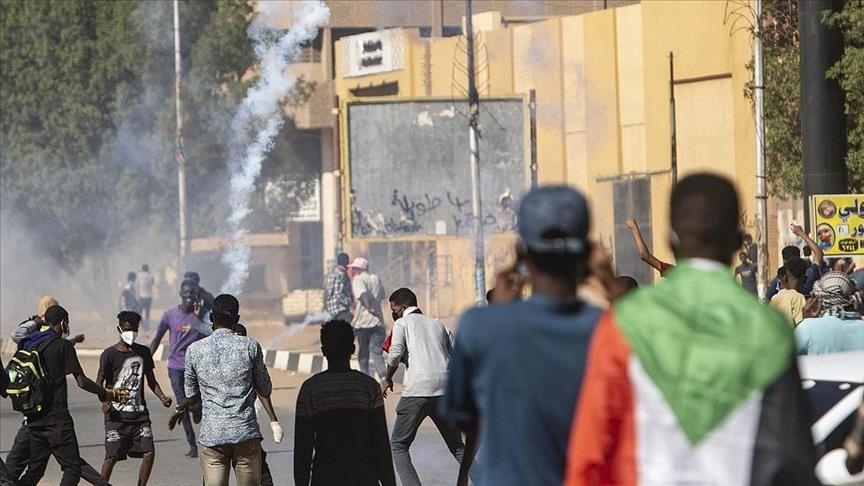Coups, civil wars, pandemic, terrorism dominated Africa in 2021
War in Ethiopia, coups in Sudan, Guinea, former leader jailed in South Africa

JOHANNESBURG
2021 was tough for many on the African continent, where civil wars, terrorism and the coronavirus pandemic continued to claim thousands of lives.
Africa, which has been striving to move forward in the transition to democracy for several countries, was moved backward with military coups in Guinea and Sudan.
Fierce fighting also continued in Ethiopia’s Tigray region, where a raging war broke out in November 2020 between the government of Prime Minister Abiy Ahmed and forces of the Tigray People's Liberation Front (TPLF).
Thousands have been killed in Tigray where 2.2 million people are said to have been displaced, according to the UN refugee agency UNHCR.
Coups
In October, the Sudanese military, led by Gen. Abdel Fattah al-Burhan, took control of the government in a military coup, leading to massive pro-democracy protests.
Dozens have been killed by security forces clamping down on protestors and hundreds injured, according to Sudanese medics.
The military takeover sparked international condemnation, including punitive aid cuts, with world powers demanding a swift return to civilian rule.
The latest reports from the capital, Khartoum, claim security forces are using sexual violence and harassment, including alleged rape, to dissuade women who have been a strong pillar of ongoing pro-democracy protests, from attending rallies.
In September, Guinean armed forces also carried out a coup, toppling President Alpha Conde. He was replaced with coup leader Mamady Doumbouya, a member of the Guinean Special Forces Group and a former French Legionnaire.
Terrorism
Incidents of terrorism continued to claim lives on the continent, especially in Somalia, Mozambique, Nigeria, Uganda and the Sahel region.
There have been almost daily reports of targeted suicide bombings in Somalia carried out by al-Qaida affiliate in Somalia, al-Shabaab, which has been fighting for years to topple the government.
Meanwhile, between October and November, Uganda recorded several bomb attacks, including suicide bombers. The attacks were reportedly carried out by the Allied Democratic Forces (ADF), a Ugandan rebel outfit based in neighboring Democratic Republic of Congo (DRC) and affiliated with the Daesh/ISIS terror group.
Regional forces from southern Africa continued their mission to pacify northern Mozambique after Daesh/ISIS affiliates took control of Palma in Cabo Delgado province, killing dozens and wounding scores in 2020.
Former South African president jailed
In July, South Africa’s former President Jacob Zuma surrendered to correctional officials at the Estcourt prison to start serving a 15-month sentence.
Zuma, 79, was found guilty of contempt of court for refusing to appear before a judicial commission probing graft during his nearly decade-long presidency.
His incarceration led to violent protests, claiming more than 300 lives and billions of dollars in damages to businesses that were looted or vandalized by his alleged supporters. It was the first time a former South African president was arrested and detained.
But Zuma was granted medical parole Sept. 5, after spending two months in prison. In December, a court in the capital, Pretoria, ordered that he be returned to prison because his medical parole was reportedly granted unlawfully. He has appealed the decision.
COVID-19, omicron travel bans
As Africa continued to bear the brunt of the pandemic on a continent that has acquired just a few million vaccine doses, hardly enough for its population, it faced travel bans.
South African scientists announced in November that they discovered a new COVID-19 variant, omicron, with a large number of mutations compared to previous variants.
Western nations quickly imposed travel bans on southern African countries and other African states, fearing they could be exposed to the new variant. That sparked continent-wide outrage.
Malawi’s President Lazarus Chakwera, current chairman of Southern African Development Community regional bloc of 16 countries, described the bans as Afrophobia and not based on science.
"We must resist unjustified and unscientific travel restrictions that only serve to disadvantage developing economies,” South Africa President Cyril Ramaphosa said in November during a meeting of the Forum on China-Africa Cooperation in Dakar, Senegal.
Several leaders contract COVID-19
As leaders battled to get vaccines for their populations, many unfortunately, including heads of state and cabinet ministers, contracted the virus.
Namibian President Hage Geingob and first lady Monica Geingos tested positive in May.
While in December, Ramaphosa contracted the virus.
Several cabinet ministers and opposition politicians in South Africa have also contracted the virus but managed to recover.
Anadolu Agency website contains only a portion of the news stories offered to subscribers in the AA News Broadcasting System (HAS), and in summarized form. Please contact us for subscription options.




